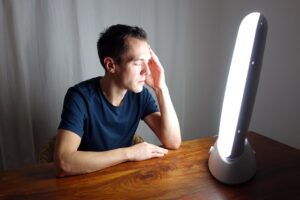
Now a new study suggests that light therapy may help people with MS get their lives back.
MS is an autoimmune disease that occurs when the body attacks the insulation around nerves, leading to fatigue, numbness, bladder problems, mood issues, and mobility problems that make every day a challenge.
But when MS patients sat in front of a light box for 30 minutes per day for two weeks, they reported being less tired and having more energy to get through their day.
Previous work has found light therapy to promote alertness, concentration, and wakefulness during the day. It’s also linked to the increased availability of serotonin and noradrenaline, two neurotransmitters responsible for regulating mood and motivation.
Although the study was very small and only featured 26 people, the results showed that sitting in front of a daylight lamp with a brightness of 10,000 lux (the recommended brightness level for effective light therapy) was better than sitting in front of a dim red light.
Of the 26 participants, half sat in front of the 10,000 lux daylight lamp, and the other half sat in front of an identical lamp that sent out dim red light.
After ruling out any sleep disorders, researchers found that 30 minutes per day with the 10,000 lux lamp was able to boost physical and mental performance in just two weeks. The changes were measured using the Fatigue Severity Scale.
Light therapy comes with no side effects and may be an effective treatment for people struggling with extreme fatigue resulting from MS. Larger studies are needed to confirm its efficacy, but trying a lightbox seems to be of negligible risk for people looking to improve energy levels.